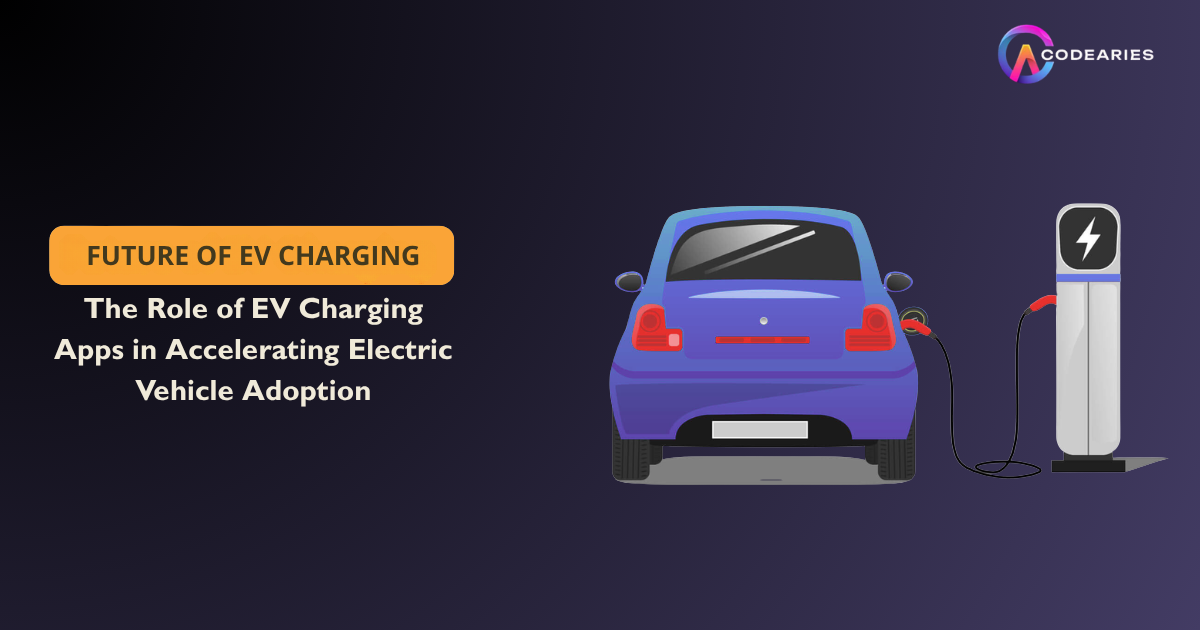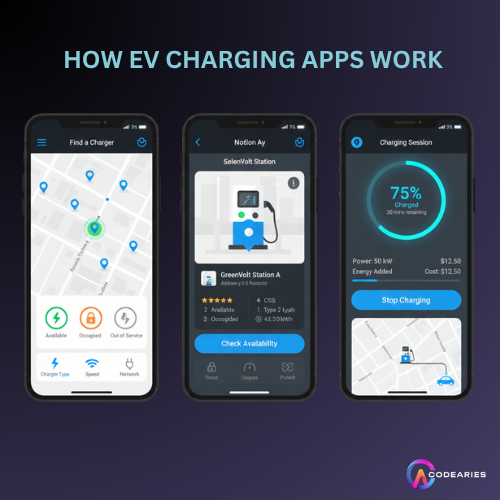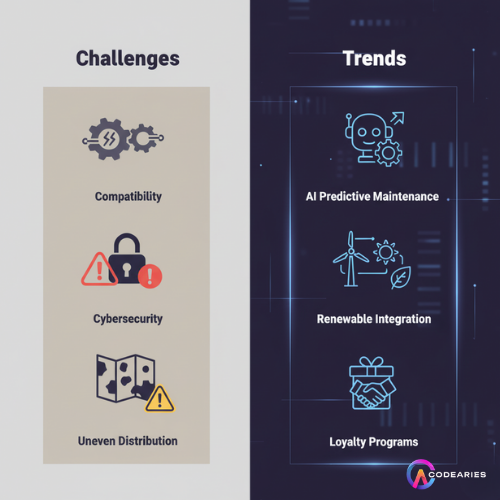
Electric vehicles (EVs) are no longer just a glance into the automotive future. They are quickly becoming essential for modern transportation. But widespread EV adoption depends on more than just efficient vehicles; it also requires a charging infrastructure that is easy to access, seamless, and smart. This is where EV charging apps come in. They offer important solutions for range anxiety, convenience, and energy management that are driving the next wave of e-mobility.
This blog looks at how EV charging apps help overcome barriers to adoption, improve user experience, and shape the future of the entire EV ecosystem. Plus, you will see how Codearies can help you take advantage of the rapid growth of this market with innovative, feature-rich EV charging solutions
The Rise of Electric Vehicles and Charging Needs
By 2025, there will be over 85,000 public charging points in major countries like the UK alone. The global market for EV charging apps is expected to exceed $9.63 billion this year, with a compound annual growth rate of over 40% through 2033. The growth is driven by:
- Government incentives and environmental rules encouraging EV use. .
- Technological advances in vehicle and charging systems.
- Rising consumer demand for green and cost-effective transportation.
- Expansion of charging networks from urban centers to rural corridors.
Yet, a major concern remains: the availability, reliability, and ease of use of charging infrastructure, often referred to as “range anxiety.”
The Role of EV Charging Apps: From Map to Payment
1. Real-Time Charging Station Discovery
Charging apps like Tesla, ChargePoint, PlugShare, and Zap-Map help EV users:
- Locate the nearest available charging point on a live map.
- Filter by charger type, speed (Level 2, DC fast charger), and network.
- Check real-time status: is a station occupied, available, or out of service?
These features directly tackle range anxiety and make trip planning easier and less stressful.

2. Route Optimization and Trip Planning
Many EV apps combine navigation with charger availability, allowing:
- Route planning that includes automatic charging stops based on vehicle type, battery status, and driving conditions.
- Estimated arrival and charging times.
- Alerts for the best or alternate charging options along the way.
3. Seamless Payment and Billing Integration
Modern apps support:
- One-tap payment options that support cards, e-wallets, or subscriptions.
- Clear billing (rate per kWh, time, or session) and digital receipts.
- Cross-network billing, allowing users to pay across multiple charging providers within the app.
This reduces friction and makes EVs a simpler, more mainstream choice.
4. Smart Charging and Energy Management
Advanced apps offer:
- Remote monitoring and initiation of charging sessions.
- Smart scheduling, allowing users to set preferred charging times during off-peak hours to save costs and support grid stability.
- Notifications when charging is complete or interrupted.
These features speed up adoption by making EVs just as convenient, or even more so, than traditional refueling.
5. Crowdsourced Reviews, Support, and Community
Apps allow users to:
- Share reviews and rate charging stations.
- Report outages or technical problems directly to operators.
- Benefit from community-driven data that enhances reliability and trust.
Overcoming Adoption Barriers: The Strategic Importance of Charging Apps
Smart, user-friendly apps are crucial for:
- Reducing range anxiety and increasing confidence in EV ownership.
- Connecting different charging networks for a seamless driving experience across the country.
- Supporting businesses and fleets with bulk management, analytics, and remote access.
- Improving infrastructure usage and return on investment by efficiently guiding drivers to available chargers.
- Closing the digital gap by connecting smart home, smart grid, and fleet systems for an integrated energy future.
Key Challenges and Emerging Trends
Challenges:
- Compatibility issues between various charging networks.
- Standardization of payment systems and access to chargers.
- Concerns about data privacy, cybersecurity, and clear billing.
- Uneven distribution of fast chargers in rural or developing areas.
Trends:
- Integration of apps with home and workplace charging, grid management, and renewable energy systems.
- Use of AI and data analytics for predicting charger maintenance needs.
- Subscription and loyalty rewards for regular users.
- Growing focus on user experience, intuitive interfaces, and language support.

How Codearies Accelerates EV Charging App Innovation
At Codearies, we help e-mobility providers, energy companies, and tech startups create and scale next-generation EV charging solutions.
Our Services Include:
- End-to-End EV App Development:
From charger maps and real-time network integration to secure payment systems and remote management. - Smart Routing & Trip Planning:
AI-powered algorithms for optimal route planning that considers battery health, charging speed, and real-time availability. - Platform Integration:
Connect to home and fleet chargers, smart meters, grid management, and renewable energy sources. - Multi-Network Payment Solutions:
Open and standardized payment processes for easy billing across networks that support cards, mobile wallets, and subscriptions. - Scalable Analytics & User Dashboards:
Data insights for operators and users, tracking energy usage, session history, popular locations, and maintenance predictions. - Localization, Accessibility, & Community Features:
Support for multiple languages, user-friendly interfaces, crowdsourced charging station data, and user reviews. - Security & Compliance:
Strong privacy protocols, secure data encryption, and adherence to all relevant standards.
From concept to launch, Codearies helps you deliver EV charging experiences that are reliable, user-friendly, and ready for the future.
Frequently Asked Questions (FAQs)
Can Codearies build a custom EV charging app for any region or network?
Yes, we specialize in adapting platforms for local, regional, and global providers, supporting various currencies, languages, and regulatory needs.
How does Codearies help with interoperability between different charging networks?
We use industry standards (like OCPP) and APIs to connect fragmented networks, allowing users to access all available chargers with a single app.
Can you integrate smart charging and home/fleet features?
Absolutely, Our solutions connect with home and fleet chargers, smart meters, and solar or renewable energy systems.
How quickly can we launch a new EV charging app with Codearies?
Standard platforms can go live in 4-8 months. We provide ongoing support and modular enhancements for scaling.
Do Codearies solutions prioritize security and data privacy?
Yes, all our apps follow the best standards for encryption, secure authentication, GDPR compliance, and regular audits to protect customer data.


